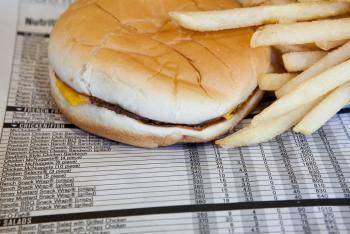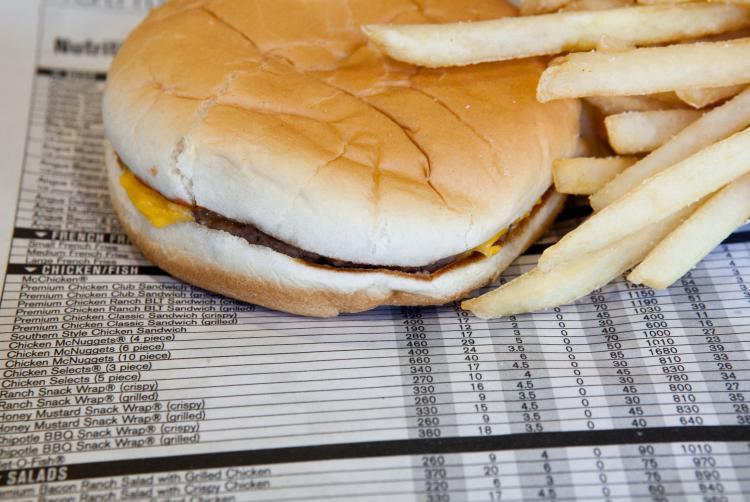NEW YORK—A study conducted by the New York University School of Medicine and the New York University Wagner School of Public Service shows that the calorie labels mandated in city restaurants since 2008 have had little effect on the eating habits of children and adolescents.
The study, published in the February issue of the International Journal of Obesity, focused on low-income, ethnic-minority families in New York City. Newark, N.J., was used for comparison. Fast-food sales data were collected from before and after the calorie information appeared in city restaurants.
Researchers surveyed 349 children, aged 1 through 17, many of whom were still influenced by their parents in food choice. They found that adolescents generally don’t pay much heed to calorie counts, and parents likewise do not consider calories when choosing food for their children.
Many adolescents (57 percent) reported noticing the calorie information, but only 9 percent considered it when making their choice. For 72 percent of teens, taste is what matters the most.
The city’s Department of Health and Mental Hygiene has embarked on its own study , though the results have yet to be peer-reviewed. According to the department’s preliminary findings, 15 percent of New Yorkers use the calorie information, and the same 15 percent eat 106 fewer calories, on average, when eating out.
The Department of Health focused on the same restaurants as did the New York University (NYU): McDonald’s, Burger King, and Wendy’s, among other fast food joints. The agency analyzed 12,000 food receipts. While the NYU study focuses on a specific demographic, the Department of Health study covers a broader range.
Lobbyist Richard Lipsky argues that there is a conflict of interest in a study conducted by a city agency that supports a controversial city mandate. Lipsky has worked for restaurant owners who say that the law is a hassle.
“They should be taken with a grain of salt,” he said of the Department of Health findings, according to Crain’s New York. “No pun intended.”
Readers who left comments about the NYU study on a fitness blog argue that the university study should also be taken with a grain of salt.
“As for the (NYU) study, I think the people they surveyed went to the fast food restaurant to partake in fast food-level calorie consumption and didn’t care about the information– it might be fair to say that people who are more calorie-conscious might stay away altogether, and in a different type of restaurant, calorie information might have more weight (pun intended),” wrote a blogger named Julie.
Another blogger maintained that whatever the labels, the ultimate decision is up to the individual. “Every single one of us knows that a Big Mac and fries [are] loaded with bad stuff. Every single one of us,” the blogger wrote.
The study, published in the February issue of the International Journal of Obesity, focused on low-income, ethnic-minority families in New York City. Newark, N.J., was used for comparison. Fast-food sales data were collected from before and after the calorie information appeared in city restaurants.
Researchers surveyed 349 children, aged 1 through 17, many of whom were still influenced by their parents in food choice. They found that adolescents generally don’t pay much heed to calorie counts, and parents likewise do not consider calories when choosing food for their children.
Many adolescents (57 percent) reported noticing the calorie information, but only 9 percent considered it when making their choice. For 72 percent of teens, taste is what matters the most.
The city’s Department of Health and Mental Hygiene has embarked on its own study , though the results have yet to be peer-reviewed. According to the department’s preliminary findings, 15 percent of New Yorkers use the calorie information, and the same 15 percent eat 106 fewer calories, on average, when eating out.
The Department of Health focused on the same restaurants as did the New York University (NYU): McDonald’s, Burger King, and Wendy’s, among other fast food joints. The agency analyzed 12,000 food receipts. While the NYU study focuses on a specific demographic, the Department of Health study covers a broader range.
Lobbyist Richard Lipsky argues that there is a conflict of interest in a study conducted by a city agency that supports a controversial city mandate. Lipsky has worked for restaurant owners who say that the law is a hassle.
“They should be taken with a grain of salt,” he said of the Department of Health findings, according to Crain’s New York. “No pun intended.”
Readers who left comments about the NYU study on a fitness blog argue that the university study should also be taken with a grain of salt.
“As for the (NYU) study, I think the people they surveyed went to the fast food restaurant to partake in fast food-level calorie consumption and didn’t care about the information– it might be fair to say that people who are more calorie-conscious might stay away altogether, and in a different type of restaurant, calorie information might have more weight (pun intended),” wrote a blogger named Julie.
Another blogger maintained that whatever the labels, the ultimate decision is up to the individual. “Every single one of us knows that a Big Mac and fries [are] loaded with bad stuff. Every single one of us,” the blogger wrote.







